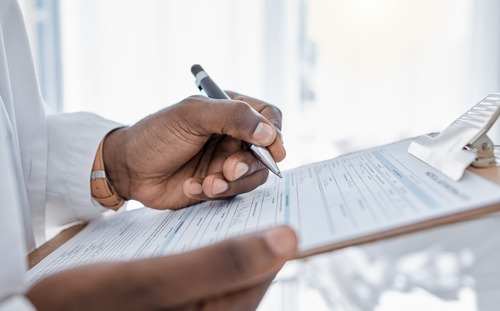Dealing with the aftermath of a car wreck can be overwhelming, especially when it comes to car insurance claims. Knowing how car insurance companies pay out is key to getting what you’re owed, especially when you have an experienced Atlanta car accident attorney.
This post breaks down the claim process from start to finish, including Georgia specific regulations
Car Insurance Claims
Car insurance claims are requests for money from an insurance company for damages or injuries from a car wreck or other covered events. The purpose of a car insurance claim is to cover financial losses, whether it’s for repairs to your vehicle, medical bills, or other related costs.
Types of Claims
There are two types of car insurance claims: property damage and bodily injury. Property damage claims cover repairs or replacement of your vehicle. Bodily injury claims cover medical bills, lost wages and other costs related to injuries from the wreck.
Filing a Car Insurance Claim
What to Do Immediately After a Wreck
After an accident, prioritize safety. Move to a safe location and check for injuries. Call law enforcement to report the wreck. Get information from the other driver, including names, contact info and insurance info.
Evidence
Document the scene. Take clear photos of all vehicles involved, any visible injuries and the surrounding area. Get contact info from any witnesses. Get a copy of the police report when it’s available as it will be needed for your claim.
Contact Your Insurance Company
Notify your auto insurance company as soon as possible. Give them all the details about the wreck. Be prepared to share the evidence you gathered, including photos, witness info and the police report. Early notification helps the claims process.
Claim Form
Your insurance company will need you to fill out a claim form. Make sure all information is accurate and complete. This includes details about the wreck, the parties involved and any damages or injuries. Incomplete or inaccurate information will delay the processing of your claim.
Adjuster
An adjuster from your insurance provider may be assigned to your case. Their job is to evaluate the damage and determine if the claim is valid. Cooperate with the adjuster, provide any additional information or documentation they request. Their evaluation will determine the payout.
Policy Limits and Deductibles
Read your insurance coverage policy limits and deductibles. The policy limit is the maximum your insurance will pay for a claim. The deductible is the amount you have to pay out of pocket before insurance kicks in. These will affect the final payout.
Claim Approval
Once you have all the necessary documentation and evidence, submit your claim to the insurance company. Make sure all information is accurate and complete. Missing or incorrect info will delay the approval process.
The insurance company will review your submitted claim. This includes looking at the accident report, photos, witness statements and any other supporting evidence. They will verify the claim is accurate and valid.
Damages
The adjuster will evaluate the damage to your vehicle and any injuries, estimating repair costs or the actual cash value of your vehicle. This means estimating repair costs or replacement value of your vehicle and medical bills. The accuracy of this will determine the claim amount.
Policy Conditions
The insurance company will review your policy to see if the claim is within the policy limits. This includes looking at policy limits, deductibles and any exclusions. Knowing your policy conditions will help you understand the payout.
Once the evaluation is done, the insurance company will make an approval decision. If the claim is valid and within policy coverage they will approve it and determine the payout. You will be notified of the approval and what to do next to receive the payment.
After approval, the insurance company pays the claim. This can be to you, a repair shop, or a lender if the vehicle is financed. The method of payment will depend on your claim and policy.
If your car insurance claim is denied, the insurance company will tell you why. Review the denial carefully and address any issues or provide additional information if needed. You have the right to contest the denial and seek legal help if needed to get a fair outcome.
Payout Options
Direct to Policyholder
If your car insurance claim is approved, the car insurance payout may be sent directly to you. This method gives you flexibility to use the funds for vehicle repairs, medical bills or other expenses as needed.
Uninsured/Underinsured Motorist
If the at-fault driver is not insured or underinsured your uninsured/underinsured motorist coverage can be triggered. Payouts will be made to you or the repair shop depending on your policy. This coverage protects you when the other driver’s insurance is not enough. Having comprehensive or collision coverage can also protect you in these situations.
Structured Settlements
For serious injuries or long term damages structured settlements may be used. Instead of a lump sum, payments are made over a period of time to cover medical bills and other expenses related to the accident.
Car Insurance Claim Payout Factors
More compensation is given for more severe damage or injuries. The insurance company will look at repair costs, medical bills and overall impact on your daily life. Your policy has a maximum payout for car insurance claims. Knowing these limits is important as anything above that is your responsibility.
Deductibles
A deductible is the amount you pay out of pocket before insurance kicks in. Higher deductibles mean lower premiums but lower claim payouts as this amount is deducted from the total payout.
Fault
Fault affects payouts. In Georgia, comparative negligence laws will adjust the compensation based on your percentage of fault, reduce the payout if you are partially or fully at fault.
Documentation and Evidence
Good documentation including photos, witness statements and medical records supports your claim. Better evidence means a fair evaluation and more payout.
Depreciation
For vehicle claims, depreciation matters as it affects the actual cash value of the vehicle. The insurance company will look at the age, mileage, and condition of the vehicle to determine its current market value, especially if the vehicle is totaled.
Claim History
Multiple claims can lead to more scrutiny and lower payouts. Insurance companies review your claim history to assess risk and determine the settlement amount.
Contact an Experienced Atlanta Car Accident Lawyer Today!
If you have been in a car accident and need to file a car accident claim, don’t go it alone. Knowing the claim payout process can make a big difference in your compensation.
If you encounter any challenges or need expert advice, our team at Buddoo and Associates can help. Contact us at 404-870-3557 ASAP for a free case review!








